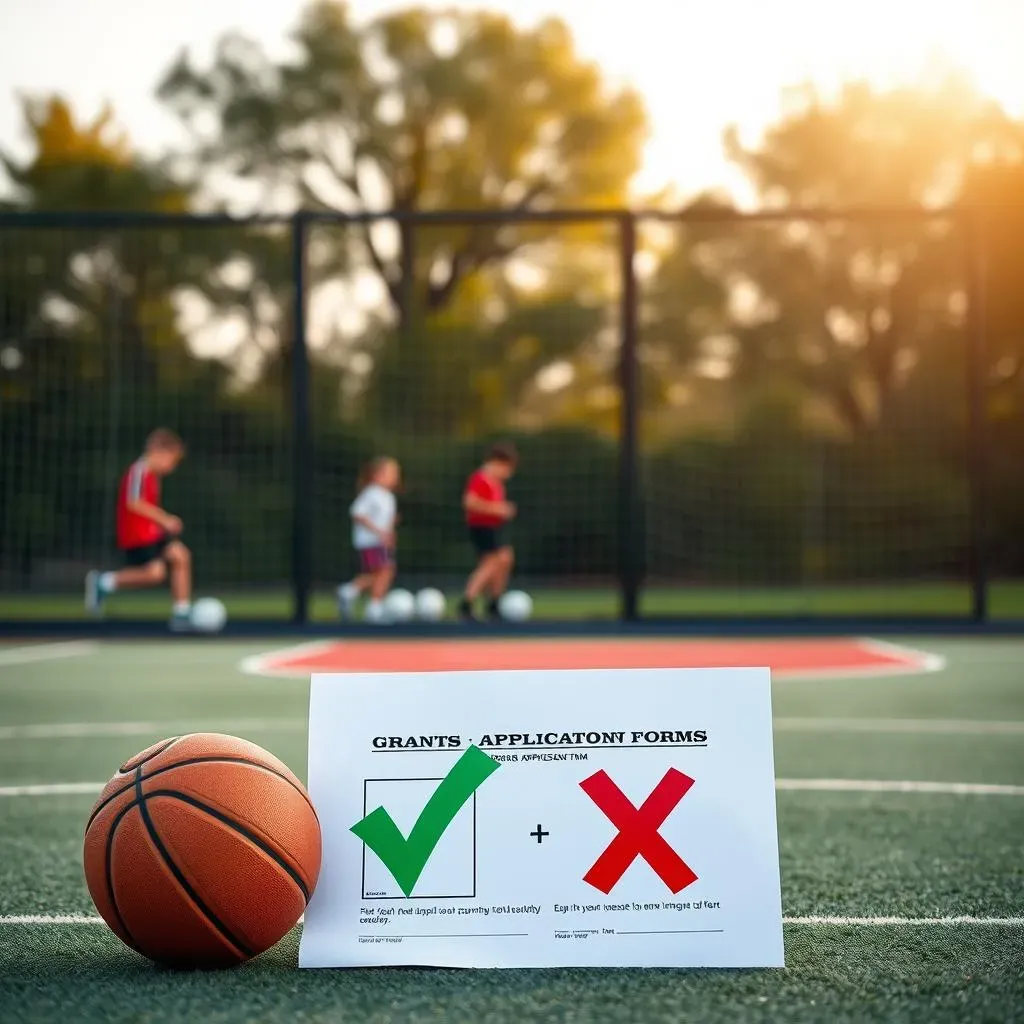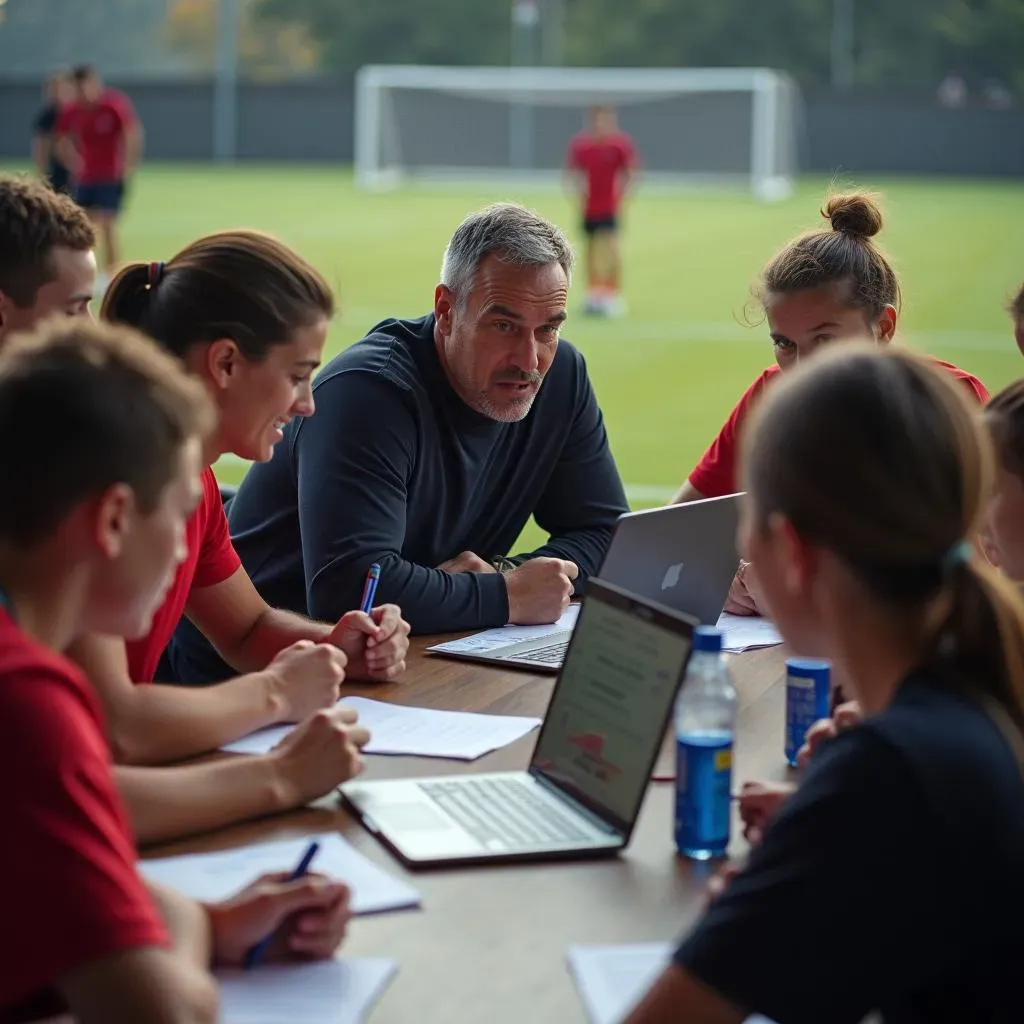Table of Contents
Running a sports team is awesome, but it can also be expensive! Equipment, uniforms, travel – the costs can quickly add up. That's where "sports team fundraising through grant applications" comes in. This article is your ultimate guide to securing the funding you need to keep your team thriving. We'll walk you through the entire process, from identifying the perfect grant opportunities to crafting a winning application and managing your funds effectively. Forget endless bake sales and car washes; we'll show you how to tap into a wealth of resources that can significantly impact your team's success. Get ready to learn the strategies and techniques that will help you navigate the world of grant applications, securing the financial support your team deserves. We'll explore real-world examples, share success stories, and even highlight common pitfalls to avoid. By the end of this article, you'll be confident in your ability to write compelling grant proposals and secure the funding your team needs to reach its full potential. Let's get started!
Finding the Right Grant for Your Sports Team

Finding the Right Grant for Your Sports Team
Identifying Your Funding Needs
Before diving into the exciting world of grant applications, take a moment to really understand what your sports team needs. Are you looking to buy new equipment? Maybe you need funds for travel to tournaments? Or perhaps you're hoping to improve your team's facilities. Knowing your specific needs will help you target grants that are a perfect fit. Think of it like this: if you need a new baseball bat, you wouldn't apply for a grant designed to fund a new soccer field, would you? Be specific! List everything, from new uniforms to coaching fees. The more detail you have, the better you'll be able to locate relevant grants.
Once you've got your list, start thinking about the overall budget. How much money do you need to cover all those expenses? Having a clear picture of your financial goals is crucial for finding the right grants. Many grants have specific funding amounts, so you'll want to find ones that align with your budget. Also, remember that some grants may require matching funds, meaning you’ll need to contribute a portion of the total cost. Make sure you factor this into your planning! Knowing your budget upfront helps you avoid wasting time on grants that are either too small or too large for your needs. Check out our guide on best fundraising practices for more tips on budgeting.
Need | Estimated Cost |
|---|---|
New Uniforms | $500 |
Tournament Travel | $1000 |
Equipment Repairs | $200 |
Searching for Relevant Grants
Now that you've got a clear picture of your needs, it's time to start your grant search! There are tons of resources available online, and many organizations specifically offer grants for youth sports and community teams. Start by searching online using keywords related to your sport and your location. For example, if you're a youth basketball team in California, you might search for "youth basketball grants California" or "community sports grants California." Don't forget to check with local organizations like your city's parks and recreation department, or any local foundations that support youth activities. They may have smaller grants that are easier to secure, and they often prioritize local projects.
Remember to be patient and persistent! Finding the right grant can take some time, and you might not find a perfect match immediately. Keep searching, and don't be afraid to broaden your search terms if necessary. Also, consider looking at grants that support broader community initiatives; even if they aren't specifically for sports, if your team contributes to the community, you may still qualify. For instance, if your team volunteers at a local food bank, a grant focused on community service might be a good fit. Don't limit yourself to grants explicitly designed for sports; think outside the box! You can also learn more about engaging your community to improve your chances.
- GrantWatch
- Foundation Center
- Local community foundations
Crafting a Winning Grant Application for Sports Team Fundraising

Crafting a Winning Grant Application for Sports Team Fundraising
Tell Your Team's Story
Think of your grant application as a story about your team. It's not just a list of expenses; it's a chance to showcase your team's passion, dedication, and impact on the community. Start by introducing your team – who you are, what you do, and what makes you special. Are you a group of dedicated young athletes striving for excellence? Do you provide opportunities for kids who might not otherwise have access to sports? Highlight your team's unique qualities and achievements. Use strong verbs and descriptive language to paint a picture of your team's spirit and accomplishments. Don't be afraid to show emotion and enthusiasm! Remember, grant reviewers are people too; they want to be moved by your story. A compelling narrative will make your application stand out from the rest. Remember to include photos or videos to make your application visually appealing. Check out our tips on writing a fundraising letter for more ideas.
Next, clearly explain your project and its goals. What are you hoping to achieve with the grant funding? Be specific and measurable. For example, instead of saying "improve our equipment," say "purchase 10 new basketballs and 5 sets of uniforms to equip our 20-player team for the upcoming season." The more concrete your goals, the more likely it is that grant reviewers will understand your needs and see the value of your project. Make sure your goals are aligned with the grant's mission and focus. It's a waste of time applying for a grant that doesn't support your project's objectives. A well-defined project will enhance the credibility of your application.
Section | Key Elements |
|---|---|
Introduction | Team history, mission, unique qualities |
Project Description | Specific goals, measurable outcomes, budget |
Highlighting Impact and Sustainability
Once you've laid out your project, it's crucial to explain how it will benefit the community and why it's sustainable. What impact will your project have on your team and the wider community? Will it improve the players' skills, promote teamwork, or foster a sense of community? Quantify your impact whenever possible. For example, you could say that your new equipment will allow your team to participate in more tournaments, leading to increased exposure and improved athletic performance. Show how your project creates a positive impact. Consider the long-term sustainability of your project. Will your team be able to maintain the improvements or benefits after the grant funding ends? Show that you have a plan in place to ensure the long-term success of your project and how you will continue to support it. This demonstrates responsible financial management and increases your chances of getting funded.
Finally, don't forget the nitty-gritty details. Your budget should be clear, concise, and well-justified. Explain how the grant funds will be used and provide specific examples. Make sure your application adheres to all the guidelines and requirements of the grant. Double-check your application for any errors or omissions before submitting it. A well-organized application shows that you are serious about your project and that you've taken the time to put together a strong proposal. Consider using a checklist to ensure you haven't missed any critical elements. Remember, a well-structured application reflects professionalism and attention to detail. Check out our guide on best fundraising practices for more tips.
- Community impact
- Long-term sustainability
- Detailed budget
Managing Your Sports Team's Grant Funding

Managing Your Sports Team's Grant Funding
Managing Your Team's Grant Money
Okay, so you landed that grant! High five! Now, the real work begins: managing those funds responsibly. Think of this grant money as a precious resource – you want to make sure every dollar counts. First things first, set up a separate bank account specifically for your grant funds. This keeps everything organized and makes tracking expenses super simple. You'll also want to create a detailed budget that outlines exactly how you'll spend the money. Stick to your budget religiously – this shows grant providers that you're serious about financial accountability. Regularly review your spending against your budget to make sure you're on track. Consider using budgeting software or spreadsheets to make tracking even easier. For more tips on effective financial management, check out our guide on best fundraising practices.
Next, keep meticulous records of all your expenses. This means saving receipts for every purchase, documenting all transactions, and keeping a detailed log of how the money was used. This is super important, as grant providers often require detailed financial reports. This isn't just about complying with the rules; it’s also about showing transparency and responsible stewardship of the funds. You’ll be able to tell your team's story of success, and showcase how the grant helped you achieve your goals. This could even improve your chances of getting future grants! For ideas on keeping your team motivated, check out our guide on motivating players for fundraising.
Expense | Amount | Receipt |
|---|---|---|
New Uniforms | $500 | Yes |
Tournament Travel | $1000 | Yes |
Sports Team Fundraising Through Grant Applications: Success Stories and Lessons Learned

Sports Team Fundraising Through Grant Applications: Success Stories and Lessons Learned
Triumphs and Tribulations: Real-World Examples
Let's dive into some real-life examples of sports teams that successfully secured grant funding. One youth soccer team in Oregon secured a grant to upgrade their field, improving drainage and safety. Their compelling application highlighted the positive community impact – more kids playing soccer, improved safety, and increased community engagement. They meticulously documented their fundraising efforts and presented a comprehensive plan for maintaining the field. Their success shows that a well-thought-out plan and a strong narrative can make all the difference. They also emphasized their community engagement, which made their application more attractive to the grant provider. This is a great example of how demonstrating a clear need and a commitment to sustainability can lead to success. For more inspiration, check out our page on sports team fundraising success stories.
Conversely, a basketball team in Texas missed out on funding due to an incomplete application. They failed to provide a detailed budget, and their narrative lacked clarity and focus. Their application didn't clearly articulate the impact of their project on the community. This highlights the importance of a well-structured, comprehensive application. Remember, attention to detail is crucial! Even a small oversight can significantly impact your chances of securing funding. It's always wise to have someone else proofread your application before submitting it. You can also learn more about avoiding common pitfalls by reviewing our guide on challenges and solutions in sports team fundraising.
Team | Outcome | Key Factor |
|---|---|---|
Oregon Soccer Team | Success | Strong narrative, detailed plan |
Texas Basketball Team | Failure | Incomplete application, lack of focus |
Key Takeaways and Future Strategies
So, what can we learn from these examples? First, a strong narrative is essential. Grant providers want to see that you're passionate about your project and that you have a clear understanding of its impact. Don't just list your needs; tell a story that engages the reader and highlights the value of your project. Second, meticulous planning is crucial. This includes a detailed budget, a clear timeline, and a sustainable plan for maintaining the project’s success after the grant period ends. Your application needs to show that you're prepared to manage the funds responsibly. And lastly, don't be afraid to seek help! Connect with other teams, mentors, and grant writing professionals to get support and guidance. Learning from others’ experiences can be invaluable.
Looking ahead, remember that securing grant funding is an ongoing process. It's not a one-time event; consider grant applications as part of a long-term fundraising strategy. Continuously research new grant opportunities, and adapt your approach based on your past experiences. Don't get discouraged by setbacks; learn from your mistakes and keep trying! The more you apply, the better you’ll become at crafting winning proposals. Remember that persistence pays off. For extra tips on planning, check out our guide on planning a fundraising tournament. It's all about building your expertise and building relationships with grant providers.
- Strong narrative is key
- Meticulous planning is essential
- Seek help and guidance
